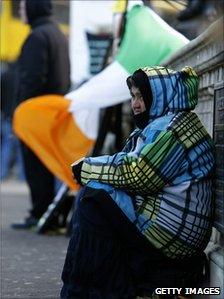Gordon Brown warns of imminent euro 'high noon'
- Published
Gordon Brown: "You've got massive banking liabilities in the euro area"
Former British Prime Minister Gordon Brown has said he fears the euro will face a "high noon" moment of reckoning early in the New Year.
"I sense that in the first few months of 2011 we [will] have a major crisis in the euro area," he told BBC business editor Robert Peston.
He said the euro's problems were bigger than just its governments' debts.
Europe must also solve the euro's structural rigidities and the enormous debts of its banks, he warned.
Europe's banks - including the UK's - faced massive liabilities and had inadequate capital to absorb losses, he said, creating the risk of a Europe-wide banking crisis.
The warning echoed complaints by Irish opposition politicians that their country had been strong-armed by Brussels into footing the bill for rescuing the Irish banks, because failing to do so could have sparked a wider European banking crisis.
'Diminishing living standards'
Mr Brown also said that the structural reforms needed to make the euro work as a single currency area had not been carried out, or even agreed.
Many economists warned at the euro's inception that weaker economies would need to have much more flexible labour markets in order to cut wage costs and maintain competitiveness, because they were giving up the option of devaluing their currency.
The former prime minister said that European politicians risked their countries being picked off one-by-one by the financial markets.
Instead he called on them to "seize the initiative from the markets" by preparing a comprehensive solution to the euro's financial and economic problems.
Failure to solve the euro's problems in one fell swoop would condemn Europe to "an unnecessary and avoidable period of low growth and high unemployment, and diminishing living standards", he said.
He added that this was something that would affect the UK too, because 60% of the country's trade was with the rest of Europe.
'Economic orthodoxy'
In the interview, Mr Brown also discussed global economic and financial problems.

Mr Brown said eurozone countries risked being picked off one-by-one
He claimed credit for having helped avoid a second depression via prompt action at the height of the 2008-09 crisis.
World leaders had not recognised the need for what he called the second and third phases of the response - namely to rebuild the international financial system and to agree a global growth strategy.
"A global financial system with national regulators was never going to work," he said.
He called for a "global constitution for banking" that would stop banks from getting around financial regulation by relocating activities to less strict countries, or by using "shadow banks" - companies that behave like banks but are not regulated.
He also attacked the "economic orthodoxy of today" in criticism that could be applied to the governments of Germany and the UK, as well as to Republicans in the US.
"Simply to cut deficits and hope that investment will return" was to repeat the failed policies of the 1930s that sustained the Great Depression, he said.
Bank deception
When asked to defend his own record in government, the former chancellor and prime minister claimed he had called for years for better international financial regulation.
He also said nobody realised how much financial risk was concentrated in individual banks, and made further accusations about a number of large banks.
More specifically, he said:
Lehman Brothers had used its London subsidiary to help it misrepresent its financial position
Northern Rock had given false information about its problems
Halifax-Bank of Scotland's dealings in the commercial property market were a one-way bet with no plan B
Royal Bank of Scotland was guilty of huge misjudgements about how to finance its takeover activities, yet had claimed to be financially sound right up to the last minute.